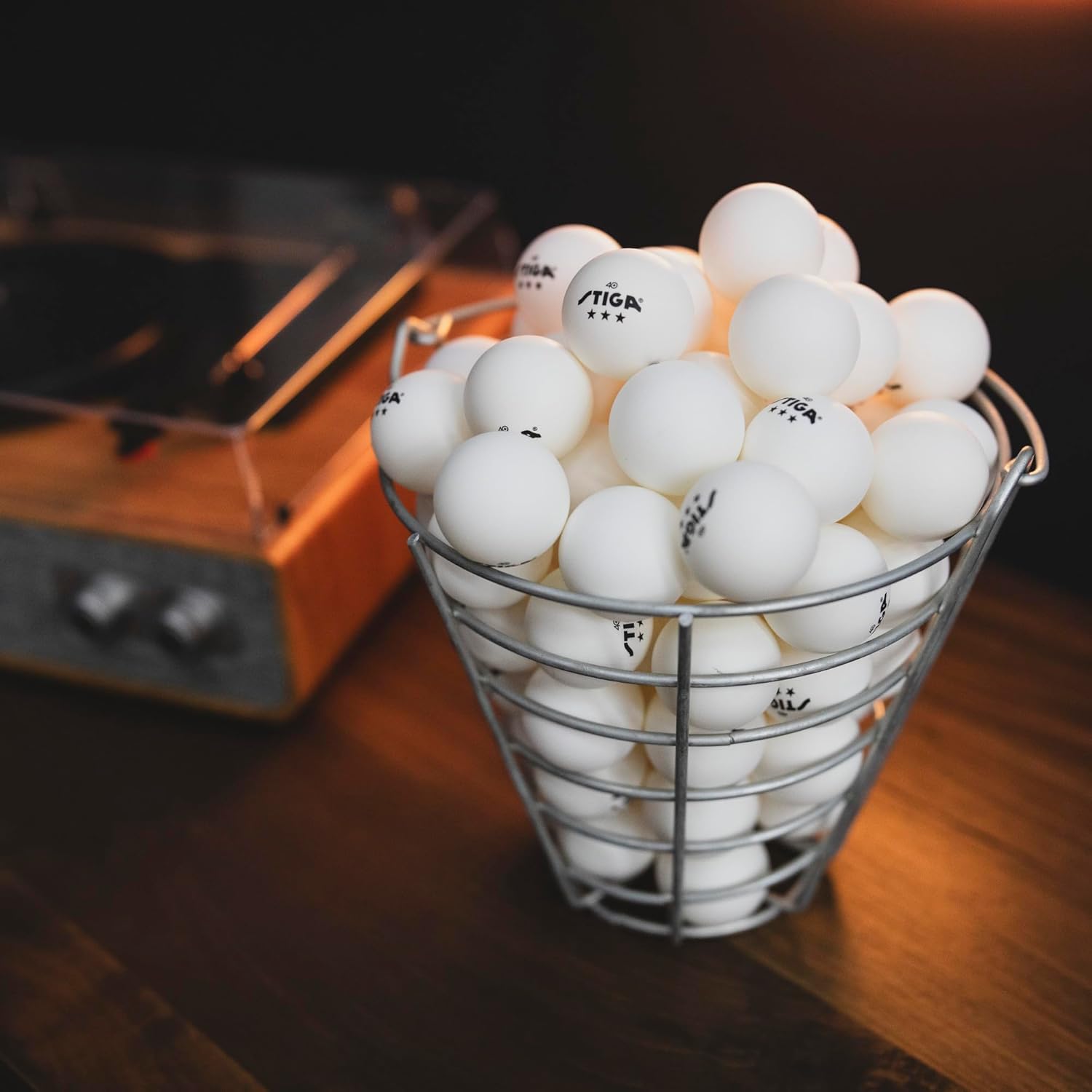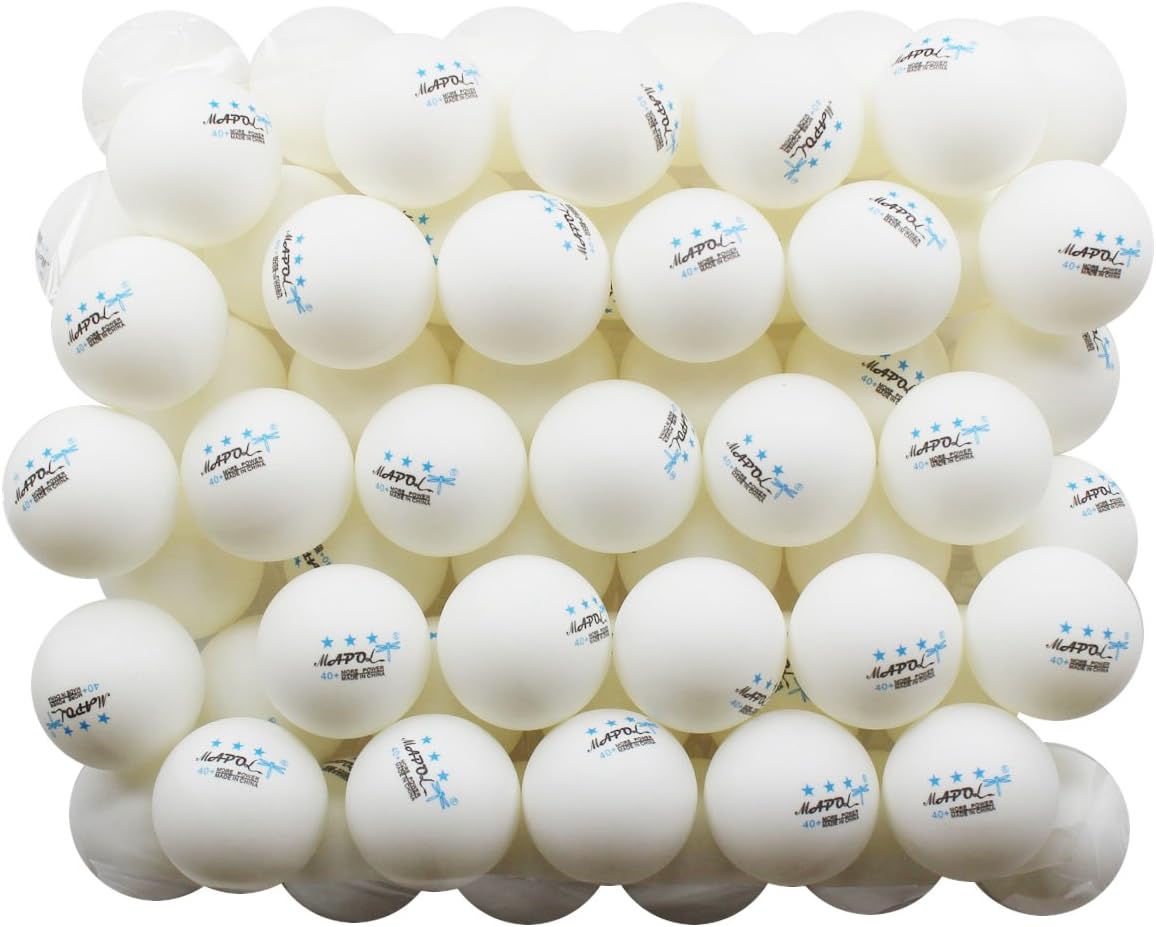Table tennis, a skilled ball sport that originated in late 19th century England, has been known as China’s “national sport” since its introduction to China in the early 20th century. Its name comes from the “ping pang” sound made when struck.

In 1926, the first World Table Tennis Championships were held in London, England. Subsequent events included the World Cup Table Tennis Championships, Olympic Table Tennis Championships, Asian Table Tennis Championships, and Asian Games Table Tennis Championships. Starting from July 1st, 2014, international table tennis competitions began using new polymer plastic balls, replacing traditional celluloid materials.
Physical Properties Of Table Tennis Balls

Table tennis ball is a small spherical object that plays a vital role in the game of table tennis. It has specific physical characteristics. The standard diameter is 40mm, though it used to be 38mm previously, and it typically weighs 2.7 grams. Usually made of celluloid or similar plastic materials, though there’s a shift towards more environmentally friendly ones now due to safety and environmental concerns.
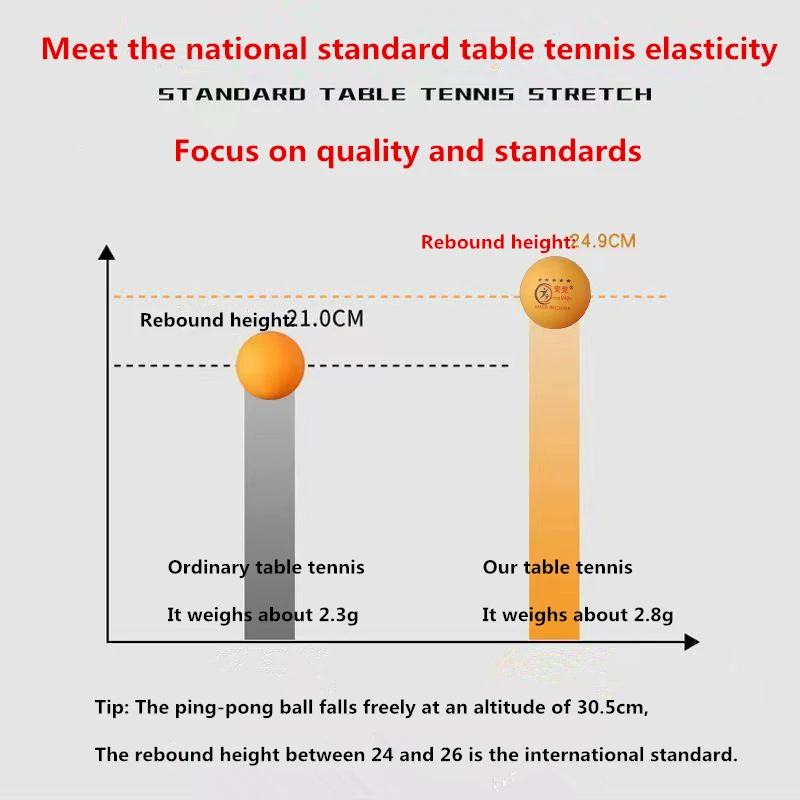
In terms of its properties, the bounce is significant. When dropped from a standard height like around 30cm onto a hard flat surface like a table tennis table, a good-quality ball should have a consistent bounce height which is affected by its material and internal pressure. Spin is also a fundamental aspect. It can be given various types like topspin, backspin, sidespin or combinations, and the ball’s surface and light weight make it highly responsive to racket strokes, influencing how it behaves after bouncing on the opponent’s side.

There are different types of table tennis balls. Training balls are made for practice, being more durable and less costly, and might have somewhat different bounce and spin traits to help players work on specific skills. Competition balls, on the other hand, must meet strict international standards regarding size, weight, bounce and other aspects, and are used in official tournaments to ensure fairness and consistency in the game.
The table tennis ball is at the core of the sport. Its movement, bounce and spin determine the strategies and techniques players adopt, and the ability to precisely control these aspects distinguishes top players from amateurs. Moreover, it also affects players’ equipment choices as they look for ways to optimize ball contact and control.
How To Choose Table Tennis Balls?
First Observe The Roundness
A high-quality ping pong ball looks very smooth and round, presenting a spherical shape as a whole. When placed still on a table, it will not tilt or roll.A table tennis ball with a roundness that does not meet the standard will tilt to one side when placed on a table, and it can be seen with the naked eye that the ball is not round or appears elliptical.
Check The Quality Of Table Tennis Balls
Appearance
When we purchase new balls, we may find that the surface of the ping pong ball is matte, and there is a feeling of astringency when touched by hand. This is because table tennis balls are made of polymer materials, so their surface is like this. Observe the connection points of the ping pong ball and check for any protrusions or indentations. If there are any, it is a defective ping pong ball that can affect overall balance. As a result, it affects the rolling trajectory of the ball and cannot be purchased.
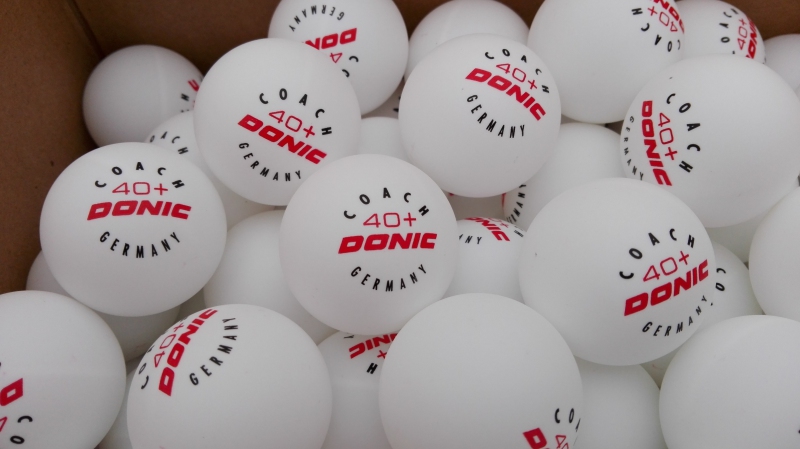
Test the jumping height of table tennis balls
Raise the ping pong ball to a certain height, then release your hand and let it fall freely. The bouncing height of the ping pong ball should be about 5/6 of its initial height, neither too high nor too low.
Check the hardness of table tennis balls
Some low-quality ping pong balls have uneven surface hardness due to substandard materials. When purchasing ping pong balls, we need to pinch them with our hands to observe whether their surface hardness is uniform.
Maintenance Table Tennis Balls

Storage Conditions
Table tennis balls should be stored in a cool, dry place. High humidity can cause the balls to absorb moisture, which may affect their bounce and performance. For example, if the balls are stored in a damp basement, they might become heavier and lose their elasticity. Extreme heat can also damage the balls, so avoid storing them near sources of heat like radiators or direct sunlight. A good storage option is a cabinet in a climate – controlled room.
Cleaning
Regular cleaning of table tennis balls is essential. Dirt, dust, and sweat from players’ hands can accumulate on the surface of the balls. To clean them, you can use a soft, damp cloth. Gently wipe the surface of the ball to remove any debris. Avoid using harsh chemicals or abrasive materials as they can scratch or damage the ball’s surface. If the ball gets wet during cleaning, make sure to let it dry completely before using it again. You can leave it in a well – ventilated area for a few hours to ensure it dries thoroughly.
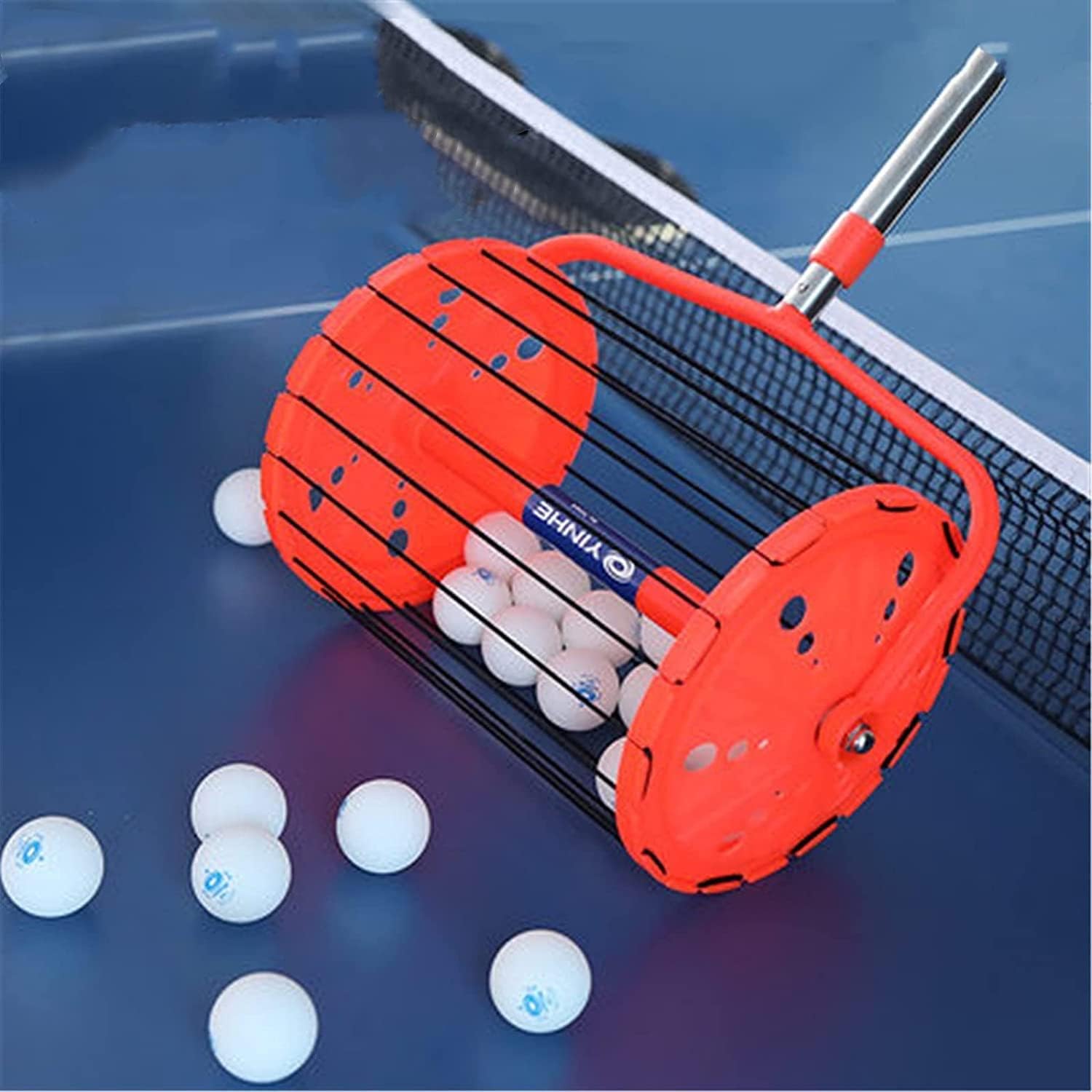
Protection from Damage
During play, table tennis balls can get damaged by hitting hard objects or being stepped on. To prevent this, make sure the playing area is clear of any sharp or hard objects. When not in use, keep the balls in a proper container such as a ball box or a mesh bag. This not only helps in organizing the balls but also protects them from accidental damage. For example, if you store the balls in a box, they are less likely to roll around and get damaged by being hit against other objects.
Rotation of Balls
If you have a set of table tennis balls for training or regular play, it’s a good idea to rotate them. This helps in distributing the wear and tear evenly among the balls. Different balls may have slightly different characteristics due to manufacturing variances or the amount of use they’ve had. By rotating them, you can ensure that no single ball is over – used and that the overall performance of the set remains consistent. For example, if you have 10 balls, you can mark them and use a different set of balls each day or session.
Table Tennis Serves
Table Tennis Ball Star Rating
The star rating of ping-pong balls is determined by the International Table Tennis Federation (ITTF) or by individual brands, primarily based on the ball’s quality, durability, and usage scenario.

One-star ping-pong balls are entry-level balls primarily used for daily practice or recreational purposes. They are manufactured with simpler processes, resulting in less precise roundness and weight distribution. Commonly made of plastic or lower-grade celluloid, these balls have moderate durability and a softer bounce when hit. They are prone to deformation and have a shorter continuous usage lifespan. Suitable for settings like ping-pong rooms, schools, military units, and organizations, one-star balls are ideal for beginners to practice with.
Two-star ping-pong balls represent a higher quality option suitable for amateur competitions or technical training. With finer manufacturing processes, these balls offer improved roundness and slightly better elasticity compared to one-star balls. Made of high-quality plastic, they exhibit better durability and bounce performance. The elasticity and spin capabilities are enhanced, making them suitable for intermediate practice. However, under high-intensity hits, their durability may slightly suffer. They are ideal for amateur competitions and advanced training sessions.
Three-star ping-pong balls are the top-of-the-line option, meeting international competition standards and being the preferred choice for professional matches. These balls are manufactured with the utmost precision, resulting in virtually zero roundness errors and uniform bounce and weight distribution. Made of premium plastic that meets environmental standards, they offer the best hand feel, fast rebound speed, and precise spin. Suitable for high-level players, these balls maintain stability even under intense competition and prolonged training.
How To Fix A Dented Ping Pong Ball
Your beloved ping-pong ball was accidentally stepped on and deflated. Looking at its “crouching” appearance, do you feel particularly bad? Don’t worry, I will give you a few tips to make your ping-pong ball inflated again and regain its vitality!

Let’s talk about the most commonly used method – hot water restoration method. This method is simple and easy to use, just a cup or basin, some hot water, and a deflated ping pong ball. Put the ping pong ball into a container, then pour in enough hot water to completely soak it in the hot water. Wait for a moment, and you will see a miracle happen – the ping pong ball slowly bulges up, restoring its original roundness and elasticity! This is because hot water causes the air inside the table tennis ball to expand due to heat, thereby squeezing out the flattened part. However, it is important to note that the water temperature should not be too high to avoid scalding oneself or damaging the table tennis ball.
If you feel that the hot water restoration method is a bit slow or want to try some novel methods, you may want to try the hair dryer restoration method. This method requires the use of a hair dryer and a deflated ping pong ball. Place the ping pong ball on a table and blow hot air onto the deflated part with a hair dryer. The hot air will rapidly expand the air inside the ping pong ball, causing it to bulge. However, it is important to note that the hair dryer should not be too close to the ping pong ball to avoid damaging its surface due to high temperatures.
In addition to the above two methods, there is another relatively “high-tech” method – vacuum pump restoration method. This method requires the use of a vacuum pump and a sealed container. The deflated ping pong ball is placed in the sealed container, and then the container is vacuumed with a vacuum pump. After a period of time, the vacuum is quickly released, and the ping pong ball will quickly bulge under the action of air pressure. However, this method requires professional equipment and is not suitable for home use.
What Brand Of Table Tennis Balls Is Good?
Nittaku 3-Star Premium 40+ Table Tennis Balls
The Nittaku 3-Star Premium 40+ Table Tennis Balls are widely regarded as some of the finest table tennis balls available. Manufactured in Japan, these ITTF-approved balls are designed to meet the highest standards of competitive play. Crafted from premium plastic, they provide exceptional durability and a consistent bounce, making them ideal for intense matches and training sessions. Their precise construction ensures excellent spin control and stability, offering players a superior playing experience. Trusted by professionals and enthusiasts alike, the Nittaku 3-Star Premium balls are perfect for anyone looking for reliable performance and unmatched quality.
PRO SPIN 3-Star Premium Table Tennis Balls
The PRO SPIN 3-Star Premium Table Tennis Balls are high-quality 40+ ABS plastic balls designed for consistent performance and durability. Suitable for both indoor and outdoor play, these tournament-grade balls offer a precise bounce and excellent spin control, making them ideal for players of all skill levels. Their seamless construction ensures reliability and durability, even during intense games. Trusted by recreational and competitive players alike, PRO SPIN balls are perfect for practice, casual matches, and professional play.
STIGA Tournament-Quality 3-Star Ping Pong Balls
The STIGA Tournament-Quality 3-Star Ping Pong Balls are designed for optimal performance in both recreational and competitive play. Crafted to meet official size and weight standards, these balls deliver consistent bounce, excellent spin, and reliable control. Made with durable materials, they can withstand intense rallies and prolonged use. Trusted by players of all levels, STIGA 3-Star balls are a great choice for high-quality table tennis experiences.
MAPOL 3-Star Premium Ping Pong Balls
The MAPOL 3-Star Premium Ping Pong Balls are high-quality 40+ training balls designed for durability and consistent performance. Made from ABS plastic, these balls deliver reliable bounce and spin, making them ideal for practice sessions and casual matches. With their robust construction, they are built to withstand repeated use without losing quality. Available in bulk packs, MAPOL balls offer excellent value for players of all levels, from beginners to advanced enthusiasts.
KEVENZ 3-Star Ping Pong Balls
The KEVENZ 3-Star Ping Pong Balls are durable and high-performance balls ideal for both recreational and training purposes. Made from ABS plastic, they provide consistent bounce and excellent spin control, ensuring a reliable playing experience. Their sturdy construction makes them suitable for extended use, and their affordability offers great value for players of all skill levels. Perfect for casual games, practice, or club-level play, KEVENZ balls are a dependable choice for table tennis enthusiasts.




